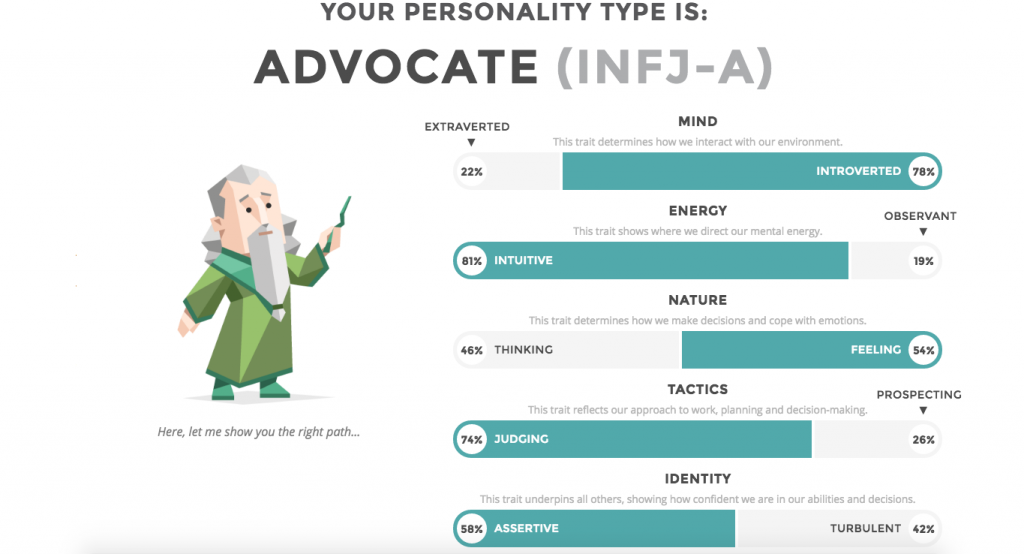My INFJ Life Changed When I Started Being More Assertive

It was the second visit to my new counselor’s office, and we were wrapping up the session. I had just left my then-husband two weeks before. Current living status: in a coworker’s tiny basement on a three-cushion cot next to her washer, dryer, and her husband’s gym equipment. It wasn’t pretty, but it was freedom.
“Okay, next week I want you to bring a list of your short and long-term goals,” my counselor told me. “Rate your self-confidence on a scale of zero to ten now, then where you’d like to see it in six months, and a year from now.”
Considering six months ago my self-confidence was probably a two on that scale, my rating of a five at that time felt like a huge improvement. I came in the next week with my goals typed out. Current self-confidence was at a five, but I hoped in six months to boost that up to a seven, with my one-year goal to be a ten.
My First Major Step Toward Self-Awareness
Two years before all this happened, I discovered MBTI. Actually, first I discovered what an introvert is, on Instagram no less. It was the first flicker of light I saw at the end of that clichéd tunnel. My tunnel was made up of a malignant narcissist who literally ran my life. My self-confidence was reading in the negative numbers. I couldn’t even go to the grocery store to buy ingredients for dinner without standing in the aisle for ten minutes worrying that I had picked out the wrong kind of bread. I would surely hear about it when I got home if I hadn’t. When you live in fear, even the simplest tasks make you freeze and debate whether or not you’re doing the right thing. It clouds your judgement, makes you act irrationally, and cloaks your denial in a blanket of false contentment.
One night, sitting on the living room couch (because I was not allowed to have “alone time” in the other room without being berated), I found an introvert themed Instagram account. It was the first time I realized that I was different from most of the people I spent my time with. Not too long after, I came across the hashtag #16personalities. That was my first eye-opening experience with MBTI. I went to the 16 Personalities website and took the test. The results were INFJ-T. You can read about INFJs here.
(What’s your personality type? We recommend this free personality test.)
Like I’m sure many of you have read before, those four letters (INFJ) changed my life. It was the first major step toward self-awareness I had ever taken, and once I got a taste for it, I couldn’t let it go. That was how I came across Introvert, Dear. It was my new obsession to Google all things INFJ. The first article I came across was about INFJs and conflict. I didn’t feel like such a freak anymore.
I Placed Too Much Value on What Others Thought
There’s another letter in that sequence, though, that not all MBTI tests have. The letter “T” stands for Turbulent. I don’t know what my percentage score was at that time, but I do remember it being heavy on the “T” and light on the “Assertive.” It meant I placed deep value on what others thought of me, and I let those external influences affect my decisions and how I thought about myself. I was more prone to be self-conscious and sensitive to stress. It also means, according to 16 Personalities, that I am “likely to experience a wide range of emotions and to be success driven, perfectionistic and eager to improve.” My whole life up to that point revolved around that last sentence. Failure was not an option. I would literally give myself panic attacks if I came close to failing at something. That drive helped me get through a master’s degree and where I am today, but there was definitely a healthier way to do it.
I went to counseling every week for a little over a year after my separation. I read self-help books. I truly wanted to break free from the crippling perfectionism that gripped me like a vice. By six months, I had reached my goal of seven on the confidence scale, and after a year, I felt that I had most certainly boosted to a nine. No, it wasn’t a ten. But with my newfound self-confidence, I was 100 percent okay with the number nine.
I took the MBTI test again later that summer and saw that my answer had changed. I was now an INFJ-A. Upon taking the test, I expected to see some fluctuations, but not a letter change. In fact, I had forgotten about the Turbulent and Assertive scale. According to 16 Personalities, “Assertive (-A) individuals are self-assured, even-tempered and resistant to stress. They refuse to worry too much and do not push themselves too hard when it comes to achieving goals.”

Self-Confidence Comes With Great Responsibility
I never expected that letter change, but when it did, it was something quantifiable that showed me I had put in the work and made some real changes. With those changes came new challenges. Freshly hewn self-confidence is a tempestuous beast. My impatience with others skyrocketed. Why couldn’t they just handle their problems directly? I wanted impassioned discussions and I wanted them now. I noticed my responses in various introvert Facebook groups had less compassion and more of a “get your shit together!” vibe.
It was like I was sixteen again and someone had handed me the keys to an 18 wheeler and said, “Here you go, kid!” I was driving down a four lane highway with no regard as to how to use a clutch, never mind to apply the brakes properly. There I was with 40 tons of steel barreling down the road, with little regard for my interpersonal relationships.
My incredibly patient boyfriend has gotten a sizable taste of it, who recently tested as an INFP-A. He handles situations differently. I used to immediately sense when there was something he perhaps didn’t want to discuss out in the open — maybe he wasn’t ready. But like a shark smelling blood in the water, I would demand he open up to me right-then-and-there-no-excuses-buddy-now-is-the-time. I was horrified when I realized that sometimes the way I was acting was similar to how my ex-husband would bully me (which would usually end up in me shutting down into complete silence).
Most recently, I’ve learned that it takes some people time to open up and express how they feel, and that practicing self-awareness means that you acknowledge those different stages and treat them with patience. I’ve also learned that being self-confident comes with great responsibility to respect where others are along their own journey. After giving a handful of not-so-helpful responses on Facebook group forums, I decided that if it wasn’t helpful or kind, I wouldn’t say it at all. I’ve learned that I can still have goals in life, but I can also slow down and enjoy the here and now. (It is still a daily struggle for me, however, to live in the present and not plan and idealize too far ahead in the future.)
While my life is much less stressful with my “identity” swayed toward Assertive, I still have a long way to go. One of the best things self-confidence can bring a person is the ability to forgive oneself for shortcomings. It is essential to growth and self-love. I can, with certainty, say that I am happy with my realization that not everything needs to work itself out the second I desire it to. And that is freedom in itself.
Did you enjoy this article? Sign up for our newsletters to get more stories like this.
Read this: You Really Can Be Happier and More Confident as an Introvert ![]()
This article may contain affiliate links. We only recommend products we truly believe in.
